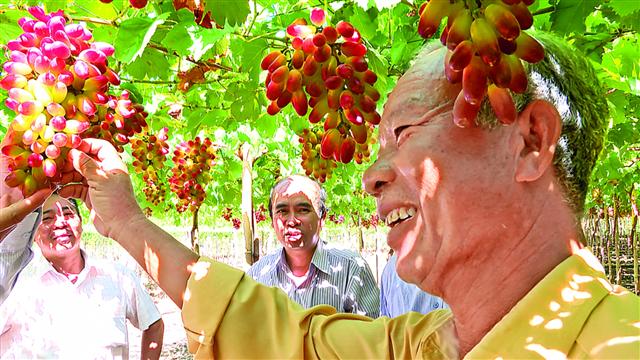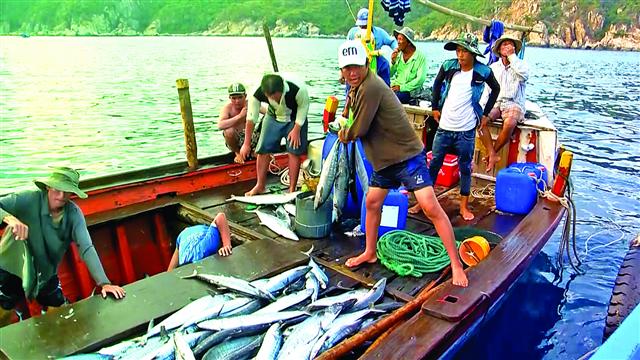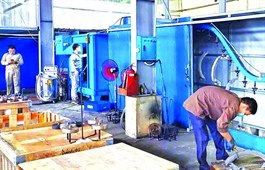Ninh Thuan turns adverse conditions into assets, yielding sweet results
Ninh Thuan turns adverse conditions into assets, yielding sweet results
High-tech application in agricultural production has created quality farm produce and yielded sweet results for the south central coastal province of Ninh Thuan.
Local agricultural specialties
Many areas in Ninh Phuoc District’s An Hai Commune and Phuoc Hai Commune feature sandy soil and suffer frequent droughts, hampering agricultural development. The Tuan Tu Cooperative in An Hai Commune was established in June 2016 and turned the specific conditions into a bonanza - growing green asparagus on a large scale.

Thanks to high-tech application in agricultural production, the province is developing agricultural products adapted to the climate and soil conditions, such as grape, jujube, sheep, asparagus and seaweed
|
Hung Ky, director of the Tuan Tu Cooperative, said the cooperative has 63 members who grow asparagus according to VietGAP standards and plan to expand the growing area according to organic standards to ensure food hygiene and safety. The lives of farmers in An Hai Commune have improved significantly due to the plant.
In recent years, the province’s policy on restructuring the agricultural sector and changing the structure of crops and animal breeding to adapt to climate change has turned sandy soil into potential land for specific agricultural products. In 2020, Ninh Thuan Province recognized 69 One Commune One Product (OCOP) products, including eight five-star products, 10 four-star products and 51 three-star products.
Tran Quoc Nam, chairman of the Ninh Thuan People’s Committee, said the province has some of the harshest natural conditions and climate in Vietnam, with the least rainfall in the country, frequent droughts and sandy soil in many areas, posing difficulties for agricultural development.
Thanks to high-tech application in agricultural production, the province is developing agricultural products adapted to the climate and soil conditions, such as grape, jujube, sheep, asparagus and seaweed. Nam said the province advocates improving the quality of agricultural products in order to generate the highest value.
Dang Kim Cuong, director of the Ninh Thuan Department of Agriculture and Rural Development, said local agencies have conducted research on specific plant varieties. For example, in addition to green and red grapes, the province is launching new products with better quality, such as black and three-color grapes.
To develop local agricultural specialties, the province has adopted policies to engage the interest of businesses in high-tech agriculture, giving priority to private firms to invest in agricultural infrastructure, and conducted transfer of farming techniques to farmers.
A number of businesses and cooperatives have invested in high-tech agriculture, with some linking up to develop value chains for their products.
The province has also strengthened advertising by promoting tourism development associated with agriculture, enhancing consumption in an effective manner.
Stronger support for agriculture
In keeping with official policy, the local agricultural sector plans to continue focusing on agricultural restructuring to adapt to climate change. Accordingly, the province encourages districts to stop growing rice on low-yield lands and replace it with crops that require less water and yield a high value, stresses the renovation and development of production organization forms, strengthens the attraction of more investment in agriculture, and promotes the application of biotechnology and other new technologies to improve product quality and ensure food hygiene and safety.
|
The province will make the best use of resources to increase competitiveness through product diversification and better meet market demand by developing OCOP products. The province will also pay higher attention to improving living conditions of rural residents and building modern new-style rural areas.
Dang Kim Cuong said the local department has approved four major projects to elevate the province’s agricultural products in the value chain. To improve livestock farming efficiency, the department plans to restructure animal husbandry to develop large concentrated breeding farms with grass fields. It will prioritize advanced breeding techniques and produce more hybrid sheep to improve the quality of its herds, while stepping up inspection of disease prevention and control efforts.
The province strives to have more 20-30 OCOP products, including 2-5 five-star products and the remaining with three-star and above ratings, while continuing to support the participation of businesses and cooperatives in the province’s OCOP program. The province will also organize trade promotion activities to strengthen consumption of OCOP products.
To achieve the goals, it is necessary to promote scientific and technological application in the development of clean and organic agriculture, which requires the participation of scientists to conduct research. In addition, investors must be capable of transferring farming techniques to farmers.
Tran Quoc Nam said Ninh Thuan Province is developing mechanisms and policies in the best way to support businesses in the deployment of clean agriculture and organic farming models.
| Tran Quoc Nam, chairman of the Ninh Thuan People’s Committee, said that despite the harsh natural conditions and climate, Ninh Thuan Province has many unique agricultural products. Together with the participation of businesses, the local agricultural sector is expected to thrive. |


























